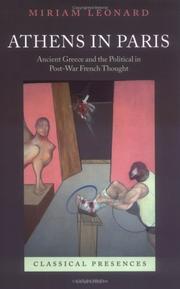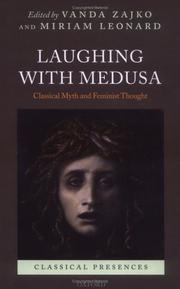| Listing 1 - 9 of 9 |
Sort by
|

ISBN: 0199277257 9780199277254 0191707414 9786610755356 0191535028 1280755350 1429430788 Year: 2006 Volume: *1 Publisher: Oxford ; New York ; Madrid Oxford University Press
Abstract | Keywords | Export | Availability | Bookmark
 Loading...
Loading...Choose an application
- Reference Manager
- EndNote
- RefWorks (Direct export to RefWorks)
Classical Presences Series Editors: Lorna Hardwick, Professor of Classical Studies, Open University, and James I. Porter, Professor of Greek, Latin, and Comparative Literature, University of Michigan The texts, ideas, images, and material culture of ancient Greece and Rome have always been crucial to attempts to appropriate the past in order to authenticate the present. They underlie the mapping of change and the assertion and challenging of values and identities, old and new. Classical Presences brings the latest scholarship to bear on the contexts, theory, and practice of such use, and abuse, of the classical past. Athens in Paris explores the ways in which the writings of the ancient Greeks played a decisive part in shaping the intellectual projects of structuralism and post-structuralism--arguably the most significant currents of thought of the post-war era. Miriam Leonard argues that thinkers in post-war France turned to the example of Athenian democracy in their debates over the role of political subjectivity and ethical choice in the life of the modern citizen. The authors she investigates, who include Lacan, Derrida, Foucault, and Vernant, have had an incalculable influence on the direction of classical studies over the last thirty years, but classicists have yet to give due attention to the crucial role of the ancient world in the development of their philosophy.
Greek drama (Tragedy). --- Political science --- Philosophy. --- France --- Politics and government --- Greek drama (Tragedy) --- Administration --- Civil government --- Commonwealth, The --- Government --- Political theory --- Political thought --- Politics --- Science, Political --- Social sciences --- State, The --- Greek drama --- Philosophy --- Political science - France - Philosophy --- France - Politics and government - 20th century
Book
ISBN: 1280491841 9786613587077 0226472493 9780226472492 0226472477 9780226472478 9781280491849 6613587079 Year: 2012 Publisher: Chicago University of Chicago Press
Abstract | Keywords | Export | Availability | Bookmark
 Loading...
Loading...Choose an application
- Reference Manager
- EndNote
- RefWorks (Direct export to RefWorks)
"What has Athens to do with Jerusalem?" Asked by the early Christian Tertullian, the question was vigorously debated in the nineteenth century. While classics dominated the intellectual life of Europe, Christianity still prevailed and conflicts raged between the religious and the secular. Taking on the question of how the glories of the classical world could be reconciled with the Bible, Socrates and the Jews explains how Judaism played a vital role in defining modern philhellenism. Exploring the tension between Hebraism and Hellenism, Miriam Leonard gracefully probes the philosophical tradition behind the development of classical philology and considers how the conflict became a preoccupation for the leading thinkers of modernity, including Matthew Arnold, Moses Mendelssohn, Kant, Marx, Nietzsche, and Freud. For each, she shows how the contrast between classical and biblical traditions is central to writings about rationalism, political subjectivity, and progress. Illustrating how the encounter between Athens and Jerusalem became a lightning rod for intellectual concerns, this book is a sophisticated addition to the history of ideas.
Philosophy, Ancient --- Jewish philosophy. --- Judaism and philosophy. --- Philosophy and Judaism --- Philosophy --- Jews --- Philosophy, Jewish --- Philosophy, Israeli --- Ancient philosophy --- Greek philosophy --- Philosophy, Greek --- Philosophy, Roman --- Roman philosophy --- Influence. --- Socrates --- Socrate --- Criticism and interpretation. --- Jewish philosophy --- Judaism and philosophy --- Influence --- judaism, philhellenism, hebraism, hellenism, freud, nietzsche, marx, kant, moses mendelssohn, matthew arnold, classicism, bible, philology, rationalism, subjectivity, progress, athens, jerusalem, philosophy, socrates, ancient greece, phaedo, french revolution, noah, feuerbach, zion, dionysus, prometheus, nonfiction, essence of christianity, secularism, god is dead, reason. --- Sokrates --- Sokrat, --- Sokrates, --- Suqrāṭ, --- Su-ko-la-ti, --- Sugeladi, --- Sokuratesu, --- Sākreṭīsa, --- Socrate, --- سقراط, --- Σωκράτης,
Book
ISBN: 0674286944 0674286928 9780674286924 9780674743939 0674743938 Year: 2015 Publisher: Cambridge, MA
Abstract | Keywords | Export | Availability | Bookmark
 Loading...
Loading...Choose an application
- Reference Manager
- EndNote
- RefWorks (Direct export to RefWorks)
Under the microscope of recent scholarship the universality of Greek tragedy has started to fade, as particularities of Athenian culture have come into focus. Miriam Leonard contests the idea of the death of tragedy and argues powerfully for the continued vitality and viability of Greek tragic theater in the central debates of contemporary culture.
Tragic, The. --- Tragedy. --- Drama
Book
ISBN: 9780226213347 022621334X Year: 2015 Publisher: Chicago (Ill.) : University of Chicago press,
Abstract | Keywords | Export | Availability | Bookmark
 Loading...
Loading...Choose an application
- Reference Manager
- EndNote
- RefWorks (Direct export to RefWorks)
Jewish philosophy. --- Jewish philosophy. --- Judaism and philosophy. --- Judaism and philosophy. --- Philosophy, Ancient --- Philosophy, Ancient --- Influence. --- Influence.
Book
ISBN: 9780198727798 0198727798 0191800678 Year: 2015 Volume: *38 Publisher: Oxford Oxford University Press
Abstract | Keywords | Export | Availability | Bookmark
 Loading...
Loading...Choose an application
- Reference Manager
- EndNote
- RefWorks (Direct export to RefWorks)
From around 1800, particularly in Germany, Greek tragedy has been privileged in popular and scholarly discourse for its relation to apparently timeless metaphysical, existential, ethical, aesthetic, and psychological questions. As a major concern of modern philosophy, it has fascinated thinkers including Hegel, Kierkegaard, Nietzsche, Freud, and Heidegger. Such theories have arguably had a more profound influence on modern understanding of the genre than works of classical scholarship or theatrical performances. Tragedy and the Idea of Modernity considers this tradition of philosophy in relation to the ancient Greek works themselves, and mediates between the concerns of classicists and those of intellectual historians and philosophers. The volume is organized into sections treating issues of poetics, politics and culture, and canonicity, and contributions by an interdisciplinary range of scholars consider themes of catharsis, the sublime, politics, and reconciliation, spanning 2,500 years of literature and philosophy. Although firmly anchored in the classical tradition, the volume suggests that the tradition of philosophical thought concerning tragedy has a major place in understandings both of ancient tragedy and of modernity itself.
Classical Greek literature --- Philosophy and psychology of culture --- Theatrical science --- Aesthetics --- Drama --- Greek drama (Tragedy) --- Modernism (Literature) --- Philosophy. --- Bernays, Jacob, --- Hölderlin, Friedrich, --- Benjamin, Walter, --- Sophocles. --- Hegel, Georg Wilhelm Friedrich, --- Kierkegaard, Søren, --- Hebbel, Friedrich, --- Wagner, Richard, --- Heidegger, Martin,

ISBN: 1280757906 9786610757909 0191556920 1423767934 9780191556920 019927438X 9780199274383 Year: 2006 Publisher: Oxford New York Oxford University Press
Abstract | Keywords | Export | Availability | Bookmark
 Loading...
Loading...Choose an application
- Reference Manager
- EndNote
- RefWorks (Direct export to RefWorks)
"Laughing with Medusa" explores a series of interlinking questions, including: Does history's self-positioning as the successor of myth result in the exclusion of alternative narratives of the past? How does feminism exclude itself from certain historical discourses? Why has psychoanalysis placed myth at the centre of its explorations of the modern subject? Why are the Muses feminine? Do the categories of myth and politics intersect or are they mutually exclusive? Does feminism's recourse to myth offer a script of resistance or commit it to an ineffective utopianism? Covering a wide range of subject areas including poetry, philosophy, science, history, and psychoanalysis as well as classics, this book engages with these questions from a truly interdisciplinary perspective. It includes a specially commisssioned work of fiction, "'Iphigeneia's Wedding", by the poet Elizabeth Cook.
Mythology, Classical, in literature. --- Feminism and literature --- Mythology in literature --- Literature --- Women authors --- Feminism and literature. --- Mythology in literature. --- Literature and feminism
Book
ISBN: 9780199237944 0199237948 Year: 2008 Publisher: Oxford : Oxford University Press,
Abstract | Keywords | Export | Availability | Bookmark
 Loading...
Loading...Choose an application
- Reference Manager
- EndNote
- RefWorks (Direct export to RefWorks)
Book
Abstract | Keywords | Export | Availability | Bookmark
 Loading...
Loading...Choose an application
- Reference Manager
- EndNote
- RefWorks (Direct export to RefWorks)
Science --- Depth psychology --- Sociology of culture --- Sociology of the family. Sociology of sexuality --- Politics --- Poetry --- History --- Feminism --- Mythology --- Psychoanalysis --- Theory --- Book
Book

ISBN: 9782875492937 Year: 2019 Publisher: Arlon Demdel
Abstract | Keywords | Export | Availability | Bookmark
 Loading...
Loading...Choose an application
- Reference Manager
- EndNote
- RefWorks (Direct export to RefWorks)
Depuis des années, des femmes et des hommes écrivent dans les murs de cette bibliothèque communale de Libramont-Chevigny. Je leur propose une consigne d’écriture, souvent inspirée par la littérature ou par des sensations : sons, œuvres d’art, photos, lumière, saisons. Ils partagent chaque fois à haute voix leurs créations, comme des gaufres encore chaudes juste sorties du fer…
| Listing 1 - 9 of 9 |
Sort by
|

 Search
Search Feedback
Feedback About UniCat
About UniCat  Help
Help News
News